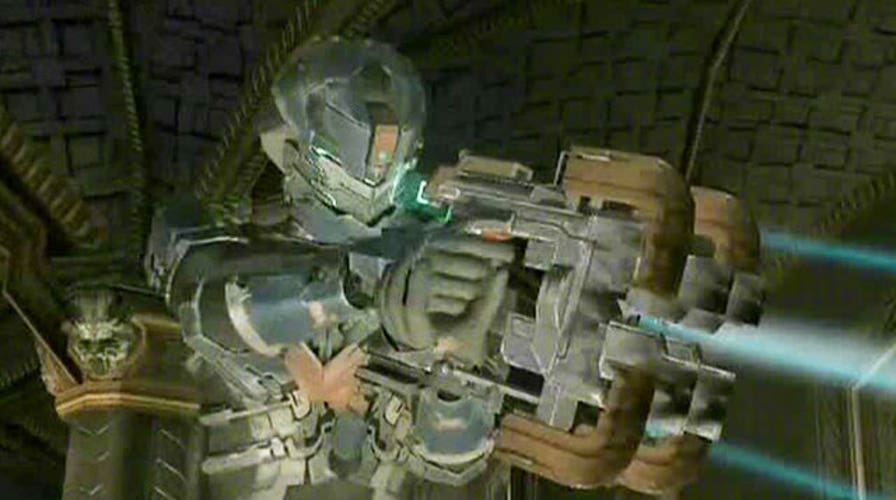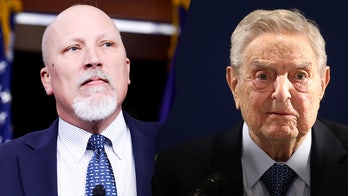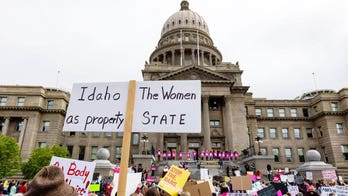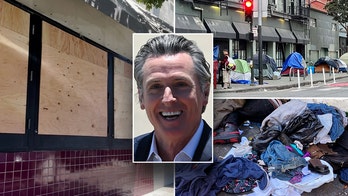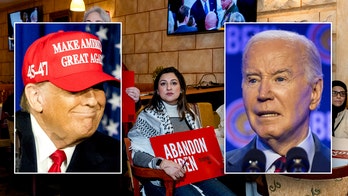Violent movies avoid scrutiny following mass shootings
William La Jeunesse reports from Los Angeles
In the wake of last week's Connecticut school shooting, many in the media and on Capitol Hill blamed one powerful lobby, the gun industry, and suggested banning assault weapons would lead to safer streets.
"On the first day of the new Congress, I intend to introduce a bill stopping the sale, transfer, importation and manufacturing of assault weapons," Sen. Dianne Feinstein D-Calif., said.
On MSNBC, Chris Matthews said "people on the far-right, on the NRA front ... they go to bed at night ... afraid somebody's going to take that gun away from them. Normal people have other interests."
On CNN, host Piers Morgan called Gun Owners of America's Larry Pratt "an unbelievably stupid man."
Yet, there's another powerful lobby in Washington that few scrutinize, let alone criticize: Hollywood, though many argue the movie and video game industry also bears responsibility for incidents of adolescent violence.
"Hollywood is very touchy about the idea of taking responsibility for the stuff it actually does," Parents Television Council's Dan Isett said. "What happened in Newtown is absolutely heartbreaking. It shouldn't take an instance like that to have 20 dead children that just went to school that morning, to have a real discussion about why this happened. To have a real discussion about what media does to our kids."
Not unlike the NRA, lawmakers fear the Motion Picture Association of America and their political allies. Consider the clout and fundraising acumen of producer Harvey Weinstein, a major heavyweight in Democratic politics, along with actors George Clooney, Brad Pitt, and Leonardo DiCaprio, all of whom have acted in or produced violent films.
In the wake of the Newtown tragedy, MPAA CEO Chris Dodd released this statement Thursday: "Those of us in the motion picture and television industry want to do our part to help America heal. We stand ready to be part of the national conversation."
But the industry in the past has defended its First Amendment right to publish without fear of government interference as aggressively as the NRA has defended members' Second Amendment right to bear arms.
"Obviously gun control is part of the debate. Mental health is part of the debate. The fact that movie violence is not part of the debate is a big problem," said Noah Gittell, a former Democratic campaign staffer who now writes about Hollywood for Reelchange.net.
Though numerous studies link violence on the screen to violent behavior, an interview with director Quentin Tarantino last week typifies Hollywood's position on the issue -- minimizing the role films play in the violent incidents carried out by young male gunmen in Newton, Conn.; Aurora and Littleton, Colo.; and other cities.
"I just think, you know, there's violence in the world, tragedies happen, (so society) blame(s) the playmakers," Tarantino said when asked about Hollywood's impact on behavior during a screening of his latest violent movie, "Django Unchained".
"Is that a question you're tired of?" asked a reporter.
"Yeah, I'm really tired. It's a western. Give me a break."
Others disagree, arguing that content matters. The depiction of violence as a means of resolving conflict on the screen can cause viewers to act out in a similar way, they say. Yet, the movie and video game industry spends millions so Congress does not change the current system of self regulation that labels content violent or not.
"Big media companies spend literally tens of millions of dollars virtually every month, lobbying in Washington and around the country to make sure that they maintain the status quo," Isett said.
Since 1998, America's five largest film studios contributed $41 million dollars to political candidates, compared with $16 million from the NRA, according to the Center for Responsive Politics.
On lobbying, the watchdog group said the MPAA spent $25 million since 1990 compared with $29 million by the NRA. The Entertainment Software Association, representing the video game industry, spent $4.4 million last year alone. That money has largely kept Congress off their backs, despite pressure from parental groups to fight the increasing violence their children are exposed to.
"There's a fear of confronting, taking on a controversial subject which is so profoundly important to get done and get done right. It baffles me," said Sen. Jay Rockefeller, D-W.Va. "It's urgent and it is not being responded to by the membership of the Congress appropriately."
Some advocacy groups have proposed a mandated ratings system that requires any movie with a murder scene get an R rating. Consider the violent Batman movie "Dark Knight." Dozens died in the movie, often graphically, but it got a PG-13 rating. Others tried to end the voluntary rating system for video games -- a $11 billion a year business. That, too, was shot down.
"It's pretty clear the MPAA does have an influence," Gittell said. "If Congress wants the MPAA to do something, they can give them a nudge in the right direction. But I do think the massive contributions members of Congress get from Hollywood would pre-empt them from ever taking full regulatory authority."
